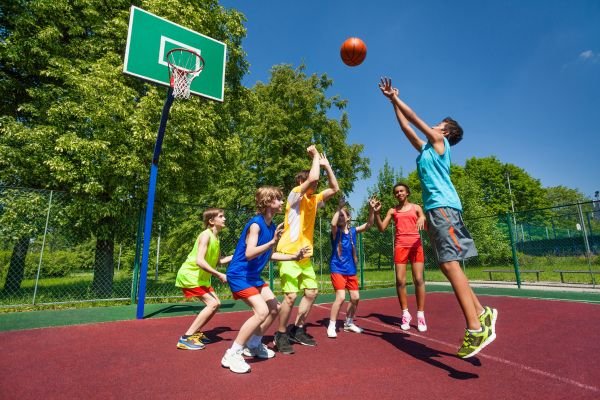Introducing sports to children at a young age can have lifelong benefits, from improved physical health to social development and teamwork skills. However, choosing the right sport for your child’s age and developmental stage is crucial. This article will explore the best sports for kids at various ages, highlighting how to make their experience enjoyable and enriching.
Why Sports Are Important for Kids
Sports can have a positive impact on a child’s life in many ways:
- Physical Health: Regular physical activity strengthens muscles, bones, and the cardiovascular system.
- Social Skills: Team sports teach children about cooperation, communication, and empathy.
- Mental Well-being: Exercise releases endorphins, reducing stress and promoting happiness.
- Self-Discipline: Sports teach kids about setting goals, practicing regularly, and staying committed.
Now, let’s dive into which sports are best for different age groups.
Sports for Toddlers (Ages 2-4)
At this age, children are developing their motor skills and coordination. The focus should be on activities that are fun, simple, and unstructured.
Best Activities for Toddlers
- Parent-Child Classes: Classes like toddler gymnastics or swim lessons are perfect for this age group. They help build motor skills in a safe and supportive environment.
- Running and Jumping Games: Activities like playing tag, hopping on one foot, or obstacle courses help improve balance and coordination.
- Biking with Training Wheels: Riding a tricycle or a balance bike introduces them to basic cycling skills.
Tips for Parents
- Keep activities short and engaging.
- Focus on fun rather than competition.
- Praise and encourage effort, not just success.
Sports for Young Kids (Ages 5-7)
Children in this age range are ready to learn basic sports skills. They are more capable of following simple rules and can benefit from participating in structured sports.
Best Sports for Ages 5-7
- Soccer: This sport is great for teaching teamwork, coordination, and agility. The games are usually short, keeping kids engaged.
- Swimming: Learning to swim at an early age is a valuable life skill. Swimming lessons also help improve strength and flexibility.
- Gymnastics: Gymnastics classes are excellent for developing balance, flexibility, and strength in a fun, energetic way.
- Martial Arts: Sports like karate or taekwondo teach discipline, respect, and self-control while enhancing motor skills.
- Tee-Ball: A simplified version of baseball, tee-ball introduces kids to hitting, running, and catching in a supportive environment.
Tips for Parents
- Encourage participation and trying new things.
- Avoid putting pressure on winning or excelling.
- Ensure your child is having fun and making friends.
Sports for Older Kids (Ages 8-12)
By this age, kids have developed more strength, coordination, and an understanding of rules. They may also begin to express a preference for specific sports.
Best Sports for Ages 8-12
- Basketball: This sport improves hand-eye coordination, teamwork, and cardiovascular fitness. It’s also easy to play in a backyard or local park.
- Baseball or Softball: These sports require focus, strategy, and teamwork, making them great for building cognitive and social skills.
- Tennis: Tennis is excellent for developing agility, coordination, and focus. It’s also a lifelong sport that can be played individually or with friends.
- Track and Field: Running, jumping, and throwing events are great for kids who enjoy testing their speed and strength.
- Dance: Dance classes can improve flexibility, strength, and rhythm while being a fun way to express creativity.
Tips for Parents
- Let your child try multiple sports before choosing one to specialize in.
- Teach them the importance of practice and perseverance.
- Be supportive, attending games and cheering them on.
Sports for Teens (Ages 13 and Up)
Teenagers are ready for more competitive and physically demanding sports. This is often the stage where they commit to a specific sport or start playing at a higher level.
Best Sports for Teens
- Football (Soccer): Playing on a competitive soccer team can be a thrilling experience for teens, offering opportunities to develop strategic thinking and fitness.
- American Football: For those interested in physical, strategic sports, American football can be an excellent option. Safety precautions, such as proper equipment, are crucial.
- Volleyball: Volleyball is great for developing hand-eye coordination, teamwork, and communication skills.
- Rowing: This sport teaches discipline and teamwork while providing an intense full-body workout.
- CrossFit for Teens: Age-appropriate CrossFit classes focus on strength, endurance, and agility while promoting a sense of community.
Tips for Parents
- Encourage healthy competition, emphasizing personal growth over winning.
- Talk to your teen about balancing sports with academics and other commitments.
- Support their athletic goals and be there to cheer them on.
How to Keep Kids Motivated in Sports
Here are some ways to ensure your child stays enthusiastic and committed to sports:
1. Make It Fun
The primary goal is for kids to enjoy what they’re doing. Celebrate their achievements and make practices fun by incorporating games or challenges.
2. Be a Role Model
Children often follow the example set by their parents. Show interest in physical activity by being active yourself, whether it’s jogging, cycling, or playing sports together.
3. Focus on Effort, Not Results
Teach kids that effort and improvement are more important than winning. This mindset fosters a love for sports and a willingness to keep practicing.
Finding the Perfect Sport for Your Child
The best sport for your child depends on their interests, physical abilities, and personality. Encourage them to explore different activities and let them decide what they enjoy most. Remember, the goal is to promote a healthy, active lifestyle while helping them build valuable life skills like teamwork, discipline, and resilience.
